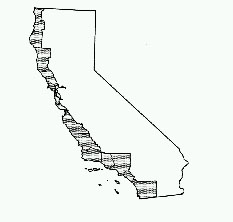COLUMN 3
Permanent Responsibilities of the California Coastal Commission
 Proposition 20 (Coastal Initiative, 1972), the
California Coastal Plan (1975), and the California Coastal Act (1976) all envisioned a permanent, state coastal management
agency. After local coastal programs (LCPs) have been fully certified and local
governments have assumed coastal permit issuing responsibilities, a variety of tasks must
be carried out by the Commission on an ongoing basis. The following list includes the
major, continuing functions mandated by law and assigned to the Coastal Commission.
Proposition 20 (Coastal Initiative, 1972), the
California Coastal Plan (1975), and the California Coastal Act (1976) all envisioned a permanent, state coastal management
agency. After local coastal programs (LCPs) have been fully certified and local
governments have assumed coastal permit issuing responsibilities, a variety of tasks must
be carried out by the Commission on an ongoing basis. The following list includes the
major, continuing functions mandated by law and assigned to the Coastal Commission.
PERMANENT FUNCTIONS:
LCP, Port Master Plan, University Long-Range Development Plan, and Public
Works Plan Amendments:
All amendments to any of these plans must be reviewed and approved by the
Commission before they can take effect (Public Resources Code 30514, 30605,
and 30716, hereinafter “PRC”).
Public Works Plans and University Long-Range Development Plans:
All of these plans, even after certification of an LCP, must be reviewed and
approved by the Commission before they can take effect (PRC 30605 and
30606).
Permit Appeals:
Certain local government and port district coastal permit actions may be
appealed to and must be acted on by the Commission (PRC 30519(a) and (b),
30603, and 30715).
Coastal Permits/Permit Reviews:
All new development proposed on tide and submerged lands, and other public
trust lands must receive a permit from the Commission (PRC 30519(b), and
30416(d)). In addition, new development under public works plans and
university long range development plans are reviewed by the Commission (PRC
30606).
Federal Activities:
Activities authorized, funded or carried out by the Federal Government that
affect coastal zone resources must be reviewed by the Commission for consistency
with the federally approved California Coastal Management Program, including the
Coastal Act (PRC 30330, and 30400). As approved by the Federal Government in
1977, and with relatively minor exceptions, the Commission is the only State
agency which can conduct this review of federal projects and activities.
Offshore Energy Projects:
All offshore oil and gas exploration, including any development on the
federal outer continental shelf, must be reviewed by the Commission.
Projects in federal waters are reviewed for consistency with California’s
federally-approved Coastal Management Program (e.g. the California Coastal
Act). A 1984 amendment to the Coastal Act requires the Commission to work
with the Governor and other agencies relative to offshore oil transportation
and refining issues (PRC 30265 and 30265.5). Marine terminals, refineries,
oil and gas pipelines, and other energy development in the coastal zone must
be regulated by the Commission (PRC 30260–30263).
Oil Spill Program:
Under the California Oil Spill Prevention and Response Act the Commission
was given additional duties, to assist in the implementation of a statewide
oil spill prevention and response program for providing the best achievable
protection for the state’s coastal and marine resources (in coordination
with other federal and state agencies). These duties include, but are not
limited to: participate in special statewide studies and taskforces
investigation programs and other mechanisms for improving oil spill
prevention and response in the state; participate in the development of
statewide emergency oil spill response protocol; clarify Commission’s role,
responsibilities, and permit process in the clean-up of oil spills; review
and comment on oil spill related regulations; review facility and vessel oil
spill contingency plans; consult on the design, planning, and operation of
wildlife rehabilitation facilities; participate in Harbor Safety Committees
to improve vessel safety within each of the state’s major ports/harbors; and
participate in the Area Contingency Planning process to improve regional
preparedness for oil spill response.
Public Access:
The implementation of a public coastal access program for the length of
California’s coastline, including maintaining and updating an access
inventory, keeping records of easements and dedications, and expediting the
opening of new accessways for public use are continuing responsibilities of
the Commission (PRC 30530–30534).
Access Guide:
The Commission has published and must periodically revise the popular
Coastal Access Guide (Ch. 868, Stats, 1979).
Enforcement:
The Commission must continue to enforce its permits and other provisions of
the Coastal Act (PRC 30800-30824).
Energy Projects and Public Works:
Upon request or on its own motion, the Commission may amend a certified LCP
to accommodate energy and public works projects if the local government
refuses to do so (PRC 30515).
LCP Reviews:
At least every five years, each LCP must be reviewed by the Commission to
determine whether the program is being effectively implemented in conformity
with the Coastal Act (PRC 30519.5).
Power Plant Siting:
Every two years, the Commission must update previously adopted maps of areas
not suitable for new coastal electric power plants and must participate in
Energy Commission decisions relative to other coastal power plant sites (PRC
30413(c) and (d)).
Guide to Coastal Resources:
The Commission has published and must periodically revise the Coastal
Resource Guide for public use (PRC 30344).
Public Participation:
The Commission must make recommendations to state and local agencies to
ensure effective public participation in their coastal resources management
decisions (PRC 30006 and 30339).
Wastewater Treatment Works:
The Commission must review coastal wastewater treatment works (PRC 30412(c)).
Restoration of Wetlands:
The Commission must work on and promote wetland restoration (PRC 30231,
30233, and 30411(b) and 30607.1).
Local Government Costs:
The Commission must review all local government mandated cost claims
resulting from Coastal Act duties and must make grants to local governments,
subject to appropriation (PRC 30350–30555 and 30340.5).
Federal Pass Through Grants:
The Commission is designated, under the federally approved California
Coastal Management Program, as the state agency to receive and pass through
federal grants to the San Francisco Bay Conservation and Development
Commission and State Coastal Conservancy.
